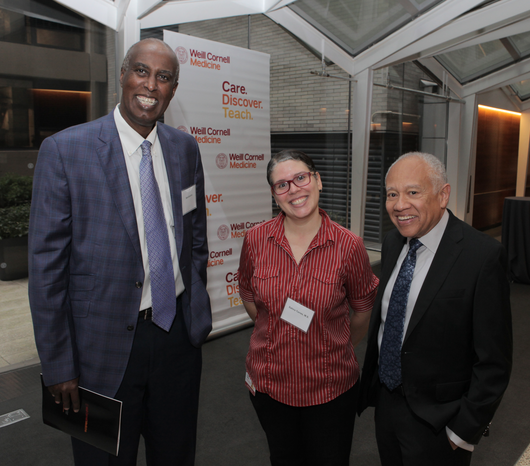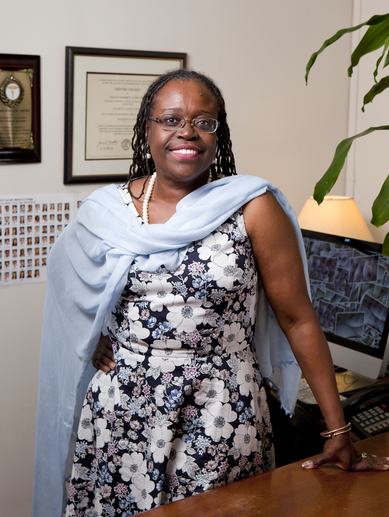In recognition of its decades-long commitment to advancing diversity within medical education, Weill Cornell Medicine’s Travelers Summer Research Fellowship Program has been awarded the 2020 Inspiring Programs in STEM Award by INSIGHT Into Diversity magazine. The magazine, which is the largest and oldest diversity-focused publication in higher education, will feature the achievement in the September 2020 issue.
The Inspiring Programs in STEM Award honors colleges and universities with initiatives that inspire underrepresented students to pursue science, technology, engineering and mathematics (STEM) careers by providing academic and professional support and research opportunities. Each year, Weill Cornell Medicine’s Travelers program offers 25 pre-medical students from underserved racial and ethnic groups or socioeconomically disadvantaged backgrounds the opportunity to gain deeper insight into the field of medicine.

From left: Dr. Said Ibrahim, senior associate dean for diversity and inclusion, Diversity Programs Associate Sahira Torres, and Dr. Bruce L. Ballard, former associate dean for equal opportunity programs
“This is a wonderful acknowledgement of our longstanding commitment to building and feeding a pipeline that facilitates the entrance of students of color into medical school,” said Dr. Joy Howell, assistant dean for diversity and student life at Weill Cornell Medicine, who became director of the Travelers program earlier this year.“While the number of underrepresented minorities entering the medical profession has increased somewhat in recent years, those numbers have not kept pace with the increase of Black and brown populations nationwide. There is no doubt that programs like Travelers are as important now as they have ever been.”
The seven-week program started in 1969 on the heels of the civil rights movement, as a way to give underrepresented students the research experience needed to become competitive medical school applicants. Since then, Travelers has trained more than 1,200 undergraduates from across the country. During the summer, the students work in laboratories, attend lectures, shadow physicians and learn about the medical school admissions process. With the assistance of dedicated staffers such as Sahira Torres, diversity programs associate, they also connect with Weill Cornell Medicine faculty members and medical students who serve as role models and mentors.

Former Travelers Summer Research Fellowship Program Director Dr. Elizabeth Wilson-Anstey
“For some students coming through the program, this is the first time they’re seeing physicians and scientists who look like them,” said Dr. Elizabeth Wilson-Anstey, a longstanding champion of diversity in academic medicine at Weill Cornell, who was integral to the development and success of the program and helped to run it for more than 40 years, until her retirement as director late last year. “That gives them the confidence that they can do this too. That’s very empowering.”
From 1969 to 2015, nearly 83 percent of Travelers alumni went on to gain admission to medical school, with about 45 percent deciding to practice medicine in underserved communities. Research has shown that a more diverse physician workforce leads to better healthcare access and improved outcomes for underserved populations, crucial to reducing health disparities among racial and ethnic minorities. Such disparities have become all the more evident during the coronavirus pandemic, with people of color becoming ill and dying at disproportionate rates.
“The Travelers program is addressing a national crisis,” said Dr. Said Ibrahim, the senior associate dean for diversity and inclusion at Weill Cornell Medicine. “It’s not only the right thing to do to help these students achieve their dreams of becoming physicians. In the long run, its purpose is also to solve the inequality of healthcare.”

